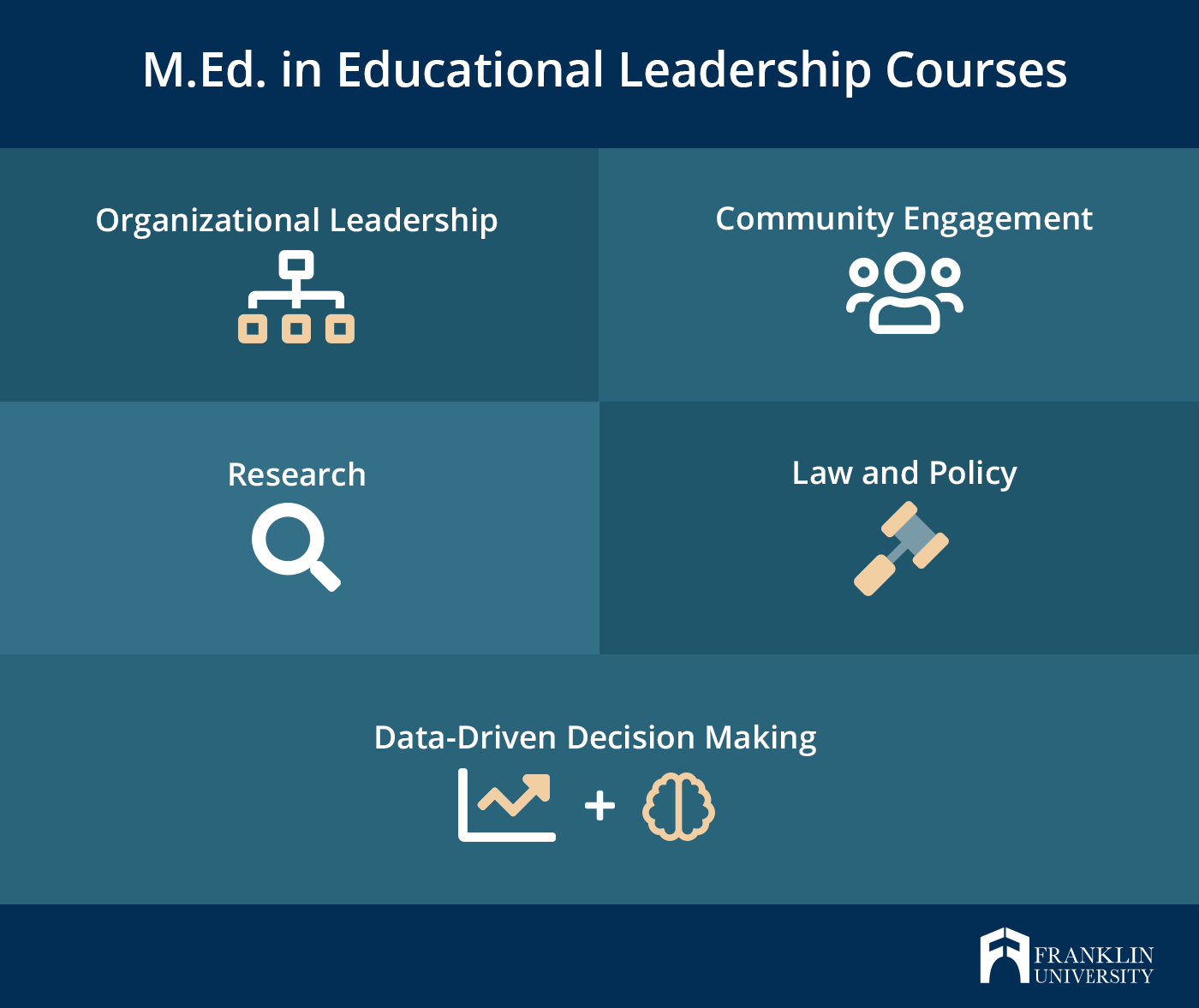Request Information
We're Sorry
There was an unexpected error with the form (your web browser was unable to retrieve some required data from our servers). This kind of error may occur if you have temporarily lost your internet connection. If you're able to verify that your internet connection is stable and the error persists, the Franklin University Help Desk is available to assist you at helpdesk@franklin.edu, 614.947.6682 (local), or 1.866.435.7006 (toll free).
Just a moment while we process your submission.

Is an M.Ed. Equivalent to an M.A. in Education?
Master of Education (M.Ed. or EdM) and Master of Arts in Education (M.A.Ed.) degree programs provide you with opportunities to continue your professional development and further your career. Whether you want to develop skills in a specific subject, position yourself for a possible pay increase, or move into an administrative role at the K-12 building level or in higher education, earning one of these master’s degrees in education can help you achieve your goal.
Continue reading to learn more about these programs and how one may be a better fit than the other depending on your career aspirations.
What’s the Difference Between an M.Ed. and an M.A. in Education?
According to Dr. Patrick A. Bennett, vice president of Academic Quality and Planning and dean of the School of Education at Franklin University, the differences between the two types of degrees are subtle and much of the coursework found in the programs is similar.
“In some ways, this is a difference without a distinction,” Bennett said. “They would essentially cover the same material.”
Here are some things to consider, though, as you look at programs.
Master of Education (M.Ed.)
An M.Ed. degree contains a mix of theory and practical skills. There are M.Ed. degrees that are helpful for becoming a better teacher, and others, like the Master of Education in Educational Leadership, that are helpful for becoming a better leader for your school district, or to achieve a leadership position. The coursework for a M.Ed. in Educational Leadership is leadership-centric. Expect a blend of leadership theory and practice, with courses such as the principles of leadership, leadership theory, critical issues in education, educational research and program evaluation and a final capstone.
Master of Arts in Education (M.A. Ed.)
An M.A. Ed. degree is focused on the theories of education and can be used for both leadership and teaching positions. This degree is often pursued by those interested in leadership positions involving policy and procedures.
Should I Choose an M.Ed. or M.A. in Education Degree Program?
Dr. Brett Tozer, chair of the School of Education at Franklin University, agrees with Dr. Bennett’s assessment that the degrees have no distinctive differences.
“I think it’s important to say there’s really no distinction,” Tozer said. “The important thing is finding the program that fits your life and your career goals because whatever follows that ‘M’ isn’t as important as whether you can actually get the ‘M.’”
Tozer says that people who are considering earning an education master's degree should ask themselves some simple questions to help find a program that's right for them.
“When you look at your life, it’s multifaceted,” says Dr. Tozer. “So you have to look at the timing of courses. You have to look at the speed at which courses are offered. What’s the completion plan? Do you need the flexibility of a program designed with an understanding of the challenges working adults face?”
As you consider programs, ask yourself:
- What are my career goals?
- How can I use this master’s degree to advance my career?
- What will my focus, or concentration, be?
- Does the college or university’s education program align with my goals?
Get a FREE education career action plan filled with resources and recommendations from those who are already there.
An M.Ed. Is the Better Choice for Education Leaders
M.Ed. and M.A. in Education degrees essentially cover the same material, says Dr. Bennett. “But if you desire to be a leader in education, you should pick an M.Ed. because it is the most-recognized degree for leadership programs.”

What Is an M.Ed. in Educational Leadership Degree?
A Master of Education (M.Ed.) in Educational Leadership is designed as a practitioner’s degree for educators who want to assume administrative or supervisory positions. The coursework is designed to hone your leadership skills and academic expertise so when you’re ready to step into a leadership role, you will be able to successfully meet the position’s challenges while improving the education of your students.
The curriculum for the M.Ed. in Educational Leadership program at Franklin University is aligned to the National Educational Leadership Preparation Program (NELP) Recognition Standards, taught by faculty who are in-field practitioners, and is always focused on connecting theory to practice.
“We actually have a guiding light,” says Dr. Tozer. “We’re not just broadly saying this is leadership. We have made sure that we are truly tied to what is recognized for leadership preparation.”
M.Ed. in Educational Leadership Courses
M.Ed. in Educational Leadership programs require between 30 and 60 credits and can take one to two years to complete. At the end of your studies, you’ll complete a cumulative project that demonstrates the knowledge you’ve gained through the program.

An advantage of the Franklin degree program is that you take three courses a trimester, but you take one at a time because they are concentrated and last just six weeks.
“By putting them at six weeks, there’s no overlap,” says Dr. Tozer. “This allows you to be focused and makes it easier for you to be successful while you continue to work. If you had to take the same three classes stretched over a regular 15-16 week term while you work, that would be a lot. You’d be juggling three different sets of assignments simultaneously.”
Tozer also says course sequencing plays an important role in the effectiveness of the program, allowing students to apply knowledge as they move through their coursework.
“Another advantage is it allows us to scaffold the program better,” he says. “When you start, we know what pathway you are going to be taking. Instead of hoping that while you’re in one class, you’re also learning something in another and are putting the pieces together, we know where you end and where you begin.”
Positions an M.Ed. in Educational Leadership Prepares You For
An M.Ed. in Educational Leadership may be the right degree for you if you’re interested in the following careers:
Dean of Students
As a dean of students, you’ll oversee student-related programs at a university or college. The average salary is $83,477, according to Payscale.
Admissions Director
In this role, you will oversee the admission process, including recruiting new and evaluating potential students. The average salary for admissions directors at colleges and universities is $73,266, according to Payscale.
Athletic Director
As an athletic director, you’ll oversee your school’s athletic department and programs, including hiring coaches and managing scheduling and budgets. According to Payscale, the average salary for an athletic director with an M.Ed. is $78,917.
Curriculum Director
Your responsibilities as a curriculum director can be wide-ranging. They often include planning, developing and implementing new programs while reviewing and evaluating those already in place. The average salary for a Curriculum Director is $74,280, according to Payscale.
Instructional Coach or Instructional Coordinator
Instructional coaches make an annual average salary of $61,136, according to ZipRecruiter. They work with and support teachers, helping them improve their lessons and incorporate new techniques into their classrooms.
“If you’re really interested in expanding what your potential can be and you’re really looking at expanding your possible career opportunities, then you want to make sure that you find the program that fits you,” says Dr. Tozer. “And that’s what we try our best to do without sacrificing your current livelihood and your current time.”
Franklin University offers two M.Ed. options. In the Master of Education (M.Ed.) in Educational Leadership with a focus in Higher Education Leadership, you’ll learn how to lead and manage the culture, people and programs that support students at colleges and universities. The Master of Education (M.Ed.) in Educational Leadership with a focus in K-12 Building-Level Leadership program will provide you with the knowledge and skills to support teachers, set policies, create systems and allocate resources. Both are tailored to fit your life and enable you to earn your degree in 12 months.





